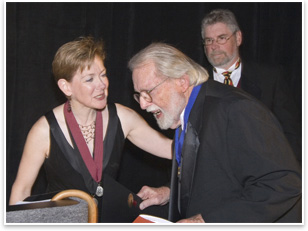| |
Wrenn Receives AIA Virginia Architecture Medal
for Virginia Service
Summary: AIA
Virginia on November 9 conferred the 2007 Architecture Medal for
Virginia Service, on Tony P. Wrenn, Hon. AIA, of Danville, during
the chapter’s Visions for Architecture Gala at the Virginia
State Capitol in Richmond. The Architecture Medal for Virginia Service,
first awarded in 1984, is the chapter's most prestigious public award
given to a non-architect for statewide efforts that serve as a model
for other efforts and have statewide educational value. Only one
Virginia Service medal is presented annually.
 Wrenn's award cites his lifelong passion for architecture and appreciation
for the built environment. The nomination recognizes, in particular,
his contributions as an archivist, architectural historian, conservator,
and photographer over the course of a 45-year career. As archivist
for the National Trust for Historic Preservation, and for the AIA,
from which he retired in 1998, he worked not just to preserve the
records of the organizations, preservationists, and architects, but
also acted as an advisor on historic district legislation, the effects
of historic preservation on real-estate values, the value of the
built environment culturally and economically, and the history of
the architecture profession. Wrenn's award cites his lifelong passion for architecture and appreciation
for the built environment. The nomination recognizes, in particular,
his contributions as an archivist, architectural historian, conservator,
and photographer over the course of a 45-year career. As archivist
for the National Trust for Historic Preservation, and for the AIA,
from which he retired in 1998, he worked not just to preserve the
records of the organizations, preservationists, and architects, but
also acted as an advisor on historic district legislation, the effects
of historic preservation on real-estate values, the value of the
built environment culturally and economically, and the history of
the architecture profession.
A love for the Old Dominion
Among Wrenn’s most notable projects in the Commonwealth of
Virginia were:
- The Dranesville Tavern, Dranesville, Va., which was moved
and preserved after it was threatened by highway widening. Wrenn
brought archaeologists, photographers, historians, and drafters to
work on the vernacular structure. The archaeological program used
high-school student volunteers in an innovative program later broadcast
internationally by the Voice of America. The tavern was successfully
moved, photographed, and drawn for the Historic American Buildings
Survey, entered in the National Register of Historic Places, and
designated a Virginia Historic Landmark.
- Woodlawn, Mt. Vernon, Va., a National Trust property, was
established by Wrenn’s research not just as the architecturally
significant home of Lawrence Lewis and Eleanor Parke Custis, but
as an important political, literary, and civil rights site, stretching
its importance from the era when George Washington gave the site
to the Lewises as a wedding present in 1799, to the present. One
occupant, Senator Oscar Underwood, appears in John Kennedy's book
Profiles in Courage, and the Baptists and Quakers who purchased
the plantation from the Lewis family made the mansion a stop on
the Underground Railroad. Wrenn believes it to have one of the
longest, most diverse, and most important histories of any of the
early Virginia mansions.
- Robert Russa Moton School, Farmville, Va., a school for black
pupils built in 1939, gained national importance in 1951, after
students there called a strike to demand better facilities. It
was close to being demolished when the State Review Board in the
Department of Historic Resources nominated it to the National Register
at a level of National Importance by unanimous approval. When the
State Historic Preservation officer, for policy reasons, would
not forward the nomination to Washington, Wrenn, then chair of
the review board, and the vice chair personally forwarded it, and
it was quickly listed on the National Register. The 1951 strike
led to a court case challenging Virginia's "Separate
but Equal" laws. The court case became a part of Brown vs.
Board of Education in which the U.S. Supreme Court struck down
segregation. In the aftermath, Prince Edward County closed its
schools, and an era of massive resistance began in the South. The
academy movement to provide whites-only education also blossomed,
both traceable to the Moton school building. The county planned
in the 1980s to transfer the school to an owner who intended to
demolish it, but promised to erect a marker noting its importance.
Now preserved to serve as a Civil Rights Study Center, it is on
the National Register and is a Virginia Landmark and a National
Historic Landmark.
Wide-reaching talents and interests
Wrenn's interest and influence reaches to the more recent past as
well. As early as 1967, he touted Saarinen’s Dulles Airport
and the planned communities of Reston and Hollin Hills as Virginia
landmarks. While employed by the AIA, Wrenn worked with students
from the School of Architecture at the University of Virginia in
a summer intern program in the AIA Archives and still works with
the School of Architecture at Virginia Tech's International Archive
of Women in Architecture, which has become internationally known
and used as a source of information on and repository of records
of women architects—long an under-recorded and under-recognized
architectural resource.
Wrenn also worked for many years as a study leader for Smithsonian
Institution tours in Virginia and writes a weekly column, "In
a Virginia Garden," now in its 17th year, for the Free
Lance-Star newspaper in Fredericksburg.
Although born and raised in North Carolina, Wrenn has made Virginia
his home since 1963—first Alexandria, then Fredericksburg,
and most recently Danville. An honorary member of both the AIA and
AIA North Carolina, Wrenn continues to write about and lecture on
architecture. Last year, he completed a monthly series for AIArchitect, presenting
a decade-by-decade
history of the Institute in celebration of its
sesquicentennial.
|
|


